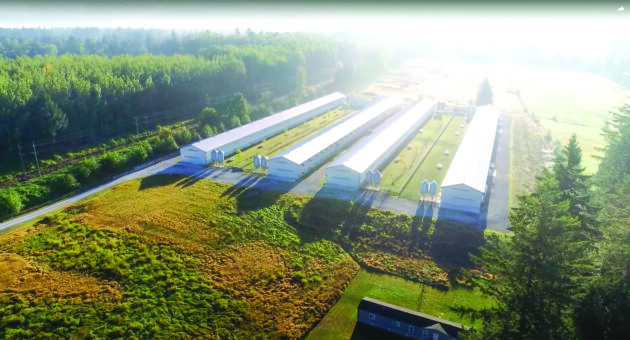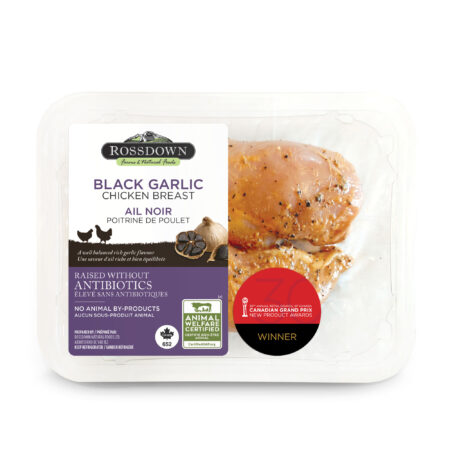
Rossdown’s farms to plate philosophy
By Monica Ferguson
Food In Canada Meat &Poultry British Columbia Editor pick Rossdown FarmsThe third-generation farm uses an integrated approach to produce chicken products
 An integrated approach helps Rossdown Farms maintain quality from start to finish. Photos © Rossdown Farms
An integrated approach helps Rossdown Farms maintain quality from start to finish. Photos © Rossdown Farms Hatch the chicks, grow the birds and then process them in a CFlA-inspected facility—this integrated approach, which was developed at Rossdown Farms over three generations, allows them to maintain quality from start to finish.
Dion Wiebe, the third-generation owner of the family farm, told Food in Canada that his grandfather, Aaron Wiebe, started Brookside Farms in 1950 in Fraser Valley, Abbotsford, B.C. In 1969, his father, Dan Wiebe, left the family business to start his own farm, Rossdown Farms.
“Both my grandfather and father started with humble beginnings and successfully grew their businesses,” said Dion. “My father, a visionary, wanted to develop and grow the business. In the early 90s, he started planning and working on a strategy to fully integrate our business. I joined and worked with him to develop the business.”

Dion Wiebe (third from left) with his family.
At that time, they had broiler chickens, turkeys, and produced fertile hatching eggs. By the late Nineties, they had built a feed mill to manufacture the feed for the farms. In the early 2000s, they built a hatchery to hatch eggs. The chicks would then be raised on Rossdown’s own farms. Dion’s son Oliver Wiebe is managing the hatchery operation.
In 2007, they built a poultry processing plant. In 2013, they also purchased the Island Farmhouse Poultry, a small poultry processing plant on Vancouver Island. Currently, Rossdown owns seven farms in Langley, Abbotsford, Agassiz and Keremeos.

Dion Wiebe and Mariana Iturri with a 2023 Retail Council of Canada’s Canadian Grand Prix New Product Award.
An integrated approach
Rossdown Farms prides itself on integrating every aspect of the poultry production process, from breeding to processing. This involves owning and controlling every link in the chain, to ensure a traceable farm to plate product.
“We own and control every aspect of the food chain of our products,” said Dion. “The advantage of us being fully integrated and owning and controlling each part of this process is that we have the ability to control the quality of our products from the very beginning to the end.”
This farm to plate integration begins with the production of broiler breeders, which yield fertile hatching eggs. These eggs are sent to the company’s hatchery, where they are incubated to produce day-old chicks. The chicks are then raised on Rossdown Farms for meat production. Finally, they’re processed in a company-owned facility.
“When it comes to poultry, quality is the most important purchase drivers for consumers, so we are very focused on quality control and traceability every step of the way to be able to bring the best possible food to Canadian homes,” said Mariana Iturri, director of marketing and innovation, Rossdown Farms.

Rossdown Farms’ organic black garlic marinated chicken breasts won a 2023 Retail Council of Canada’s Canadian Grand Prix New Product Award.
Product offering
The company has diversified its offerings to include organic and raised without antibiotics (RWA) poultry products. Organic production involves providing birds with more space to grow, access to the outdoors, and enrichments in the barns, along with certified organic feed. RWA poultry, on the other hand, is raised without antibiotics and is fed non-organic feed, emphasizing natural and sustainable practices.
Rossdown Farms’ product portfolio includes, of course, chicken, such as marinated RWA products flavoured with lemon citrus, rosemary herb and black garlic marinated breasts, and taco-seasoned dark meat skewers. The black garlic marinated chicken breasts won a 2023 Retail Council of Canada’s Canadian Grand Prix New Product Awards. Turkey is also available in the categories of organic, RWA, free range and cooked.
Retail and wholesale presence
These products can be found in grocery chains such as Whole Foods, Choices, Save-On-Foods and Nesters. Rossdown also caters to the meal kit industry, supplying to companies like HelloFresh, Chef’s Plate, and Fresh Prep. In the foodservice sector, Rossdown works with distributors like GFS and Cisco to supply restaurants with their poultry products.
Challenges
Avian influenza is a concern for entire poultry industry, including Rossdown Farms.
“Practicing good biosecurity is our biggest way of protecting ourselves from threat of avian influenza,’ said Dion. “Biosecurity has become part of our day-to-day operations. Our company does internal audits and participates in industry audits to assist in reducing the risk of infection and spread of avian influenza.”
The recent wildfires in British Columbia, thankfully, caused minimal disruptions with product deliveries for Rossdown Farms. They didn’t have to evacuate unlike many other businesses and homes in British Columbia.
“Fortunately we’ve had very little impact at this point,” said Dion.
Future plans
In 2018, Rossdown began to automate their facility with new equipment such as a deboning machine to produce boneless skinless meat. The Wiebes plan to expand their facilities to accommodate more automation and meet growing demands.
“We’ve seen significant growth over the last 10 years. We’re looking at including some of the latest automated equipment to handle increased volumes,” added Dion.
Their focus on innovation now extends to product development. The company is actively exploring ready-to-eat meal options with diverse flavour profiles, catering to consumers’ evolving preferences for convenience.
Rossdown offers five brands from its Abbotsford location—Thomas Reid Organic, Maple Hill Farms, Rossdown Farms and Natural Foods and Kings.
“The poultry industry is big in Western Canada. We’re one of the niche players,” said Dion. “We have a strong brand, which we continue to build.”
This article was originally published in the October 2023 issue of Food in Canada.
Print this page